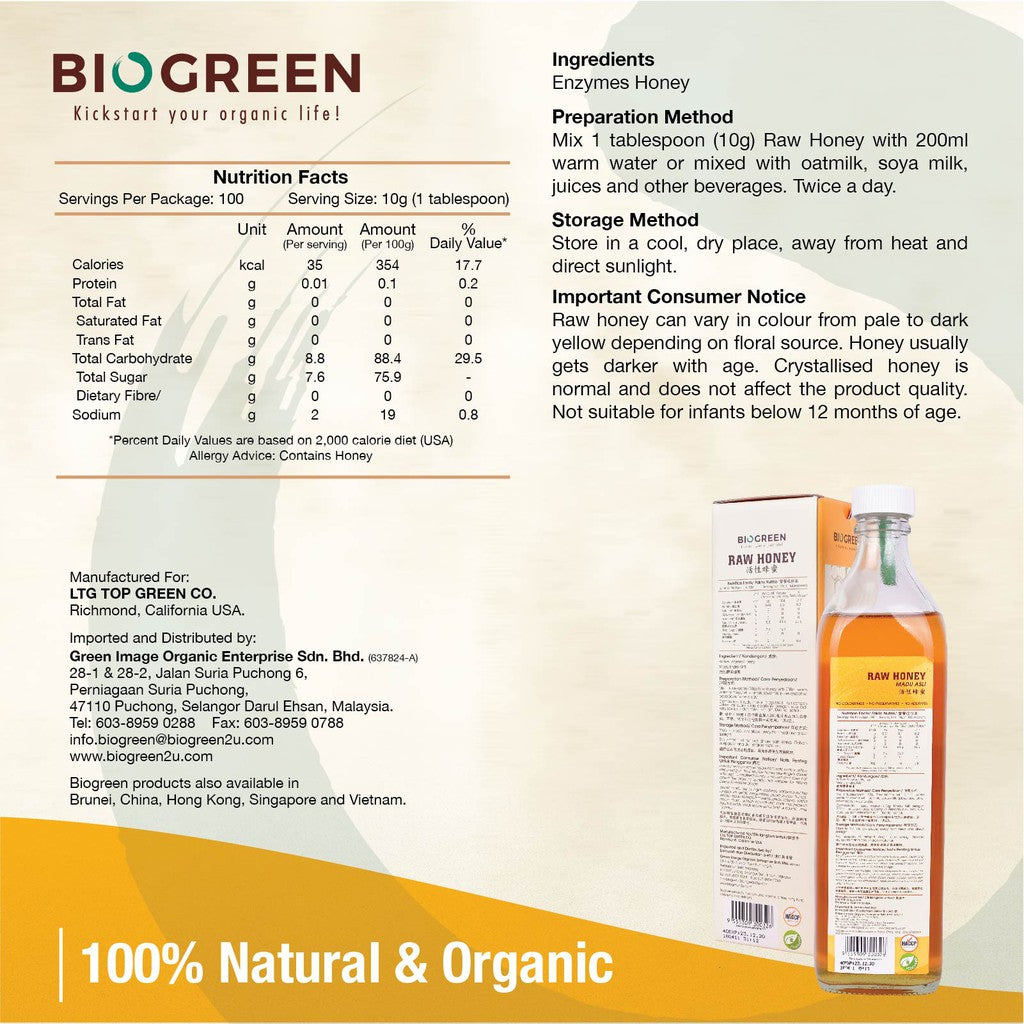Biogreen Raw Honey (HALAL) 1kg
Biogreen Raw Honey (HALAL) 1kg
Live the sweet life with this potent superfood sweetener fresh from the farm! A gift from the bees – this pure, unpasteurised and unfiltered honey is extracted at a temperature of below 60˚C to ensure the honey’s beneficial nutrients and active enzymes as well as trace amounts of bee pollen are fully retained. The active enzymes are essential to maximise nutrient absorption and optimise the benefits of the honey.
Product of USA
100% Pure Raw Honey (with Active Enzymes)
- Anti-bacterial, promotes repair of damaged intestinal lining.
- Active Enzymes: Improves food digestion and nutrient absorption.
- Promotes wound recovery.
- Reduces body heat, relieves body discomfort.
Mix 2 tablespoons (20g) with 200ml of warm water, or mixed with oatmilk, soya milk, juices or other beverages. Twice a day.
Store in cool, dry place. Away from heat and direct sunlight.
Friendly reminder: Crystallised honey is normal and does not affect the product quality
Q1: Does Biogreen Raw Honey have any certification?
The manufacturing processes of Biogreen Raw Honey are in line with the Good Manufacturing Practice (GMP) and Hazard Analysis Critical Control Point (HACCP) food quality management systems. Furthermore, Biogreen Raw Honey is routinely subjected to microbiological and heavy metal evaluations by third party laboratories, ensuring that they are the best and safe for your consumption.
Q2. Why is honey not recommended for infants below 12 months old?
Honey may contain Clostridium botulinum spores that can cause infant botulism, a rare but serious disease that affects the nervous system of young infants below one year old. C. botulinum spores are present in the environment and may be found in dust, soil and improperly canned foods. Adults and children over one year of age are routinely exposed to, but not normally affected by botulinum spores. Honey is safe to consume during pregnancy and lactation. While infants are susceptible to the infant botulism, adults, including pregnant females, are not. The concern for babies stems from the fact that infants lack the fully developed gastrointestinal tract of older humans.
Q3. I took half the bottle of Raw Honey and noticed there were sugar crystals at the bottom of the bottle. Is there any sugar added?
Biogreen Raw Honey contains 100% pure honey without artificial preservatives, additives and flavours, including synthetic sugars. The sugar crystals are honey crystals. There are several factors which can cause the crystallisation of honey:
[1] The two main types of sugars in honey are fructose and glucose and the proportion between these two naturally-occurring sugars will affect the speed of crystallisation. Honey with proportionately higher glucose content will crystallise faster compared to those with higher fructose content. For example, dandelion and clover honey crystallise much faster compared to acacia or honeydew honey due to the lower fructose to glucose ratio, this explains why some honey can stay liquid for years on shelves without crystallisation whilst some honey crystallises in just a few weeks of time. Given that Biogreen Raw Honey is a multi-floral honey (collected from various flower nectars in the wild), the fructose to glucose ratio may therefore vary from batches to batches.
[2] Additionally, honey with lower moisture (water) content speed up the crystallisation process, as glucose tend to crystallise in an environment with very low water content. These differences are attributed to the different flower or tree nectar sources.
[3] Presence of materials such as bee wax or bee pollen may also enhance the honey crystallisation process. Biogreen Raw Honey is extracted at temperature below 60 degree Celsius and did not undergo any filtration or pasteurisation processes; hence it maintains most of the honey’s beneficial nutrients and active enzymes, including minor bee pollen and propolis. Presence of bee pollen and propolis is one of the factors that cause crystallisation.
Crystallisation does not change the quality of honey. It only affects some external features, like change of colour (from clear yellow to pale yellow) and texture (fine crystals). Therefore, crystallised honey is not a defect and safe for consumption.
Q4. Does honey spoil or go bad?
As long as it is unpasteurized, no. Honey stored in properly sealed containers can remain stable for decades. However, honey is susceptible to physical and chemical changes during storage; it tends to darken and lose its aroma and flavour or crystallise.
Share




